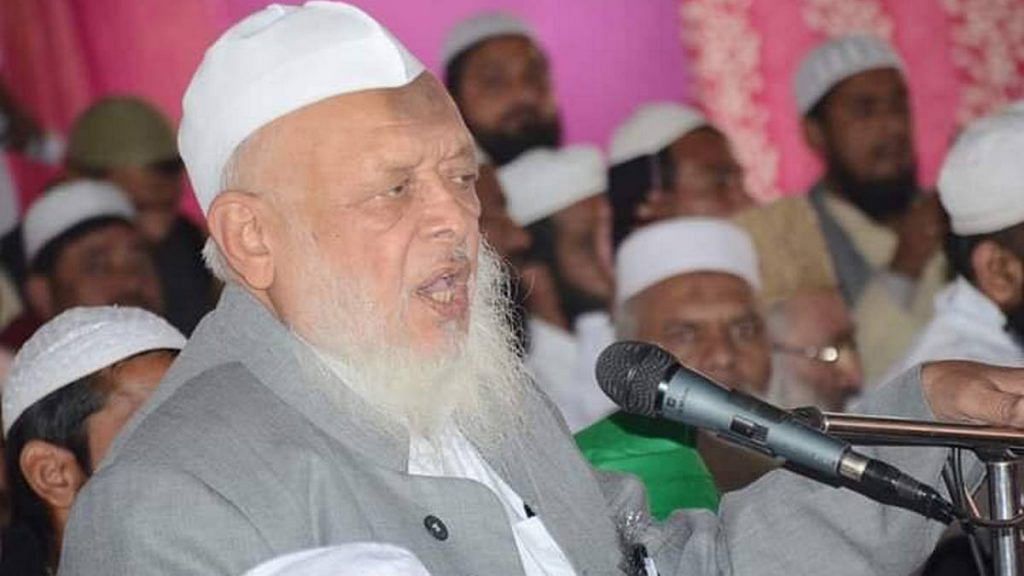New Delhi: Arshad Madani, president of the Jamiat Ulama-i-Hind, one of the key players in the Ayodhya mediation process, has said he had offered to give up the Muslims’ claim to the rest of the disputed land in exchange for the actual site where the Babri Masjid once stood.
Speaking exclusively to ThePrint, Madani said he was willing to compromise and give up the area around the mosque, including the all-important Ram Chabutra, if the Hindu side agreed to let the Muslims rebuild the Babri Masjid.
“We said give us the area which was encompassed by the four walls of the Babri Masjid, and you can keep the other areas surrounding the mosque — including the Ram Chabutra, which, in 1949, was claimed to have been Ram’s birth site,” Madani said.
“But the Hindu parties refused to budge. They were hell-bent on getting the entire land, including where the Masjid once stood.”
The Supreme Court’s hearing on the disputed 2.77-acre site at the centre of the Ram Janmabhoomi-Babri Masjid dispute ended on 16 October, with the mediation panel submitting a settlement in a sealed cover to the court. But the settlement wasn’t signed by several stakeholders.
The mediation had earlier reached a dead-end on 29 July. But in September, the Sunni Waqf Board wanted a resumption of the talks, and had written to the mediation panel, which is headed by former Supreme Court judge F.M.I. Kalifulla and includes senior advocate Sriram Panchu and spiritual leader Sri Sri Ravi Shankar.
‘If you want to take it by force…’
Sources told ThePrint that during the first round of talks in July, Sri Sri Ravi Shankar had also made an offer to the Muslims which would entail the Hindu side giving up its claim to the other disputed sites in Mathura and Varanasi.
“He proposed that the Hindus get the entire disputed land in Ayodhya, but in exchange, offered that the Hindus can give up their claim to the disputed Krishna janmabhoomi in Mathura as well as the temple-mosque dispute in Varanasi,” a source familiar with the mediation proceedings told ThePrint.
“He was in favour of strengthening the Places of Worship (Special Provisions) Act, 1991, and also offered that the control of Archaeological Survey of India-managed mosques in Delhi be give up to the Sunni Waqf Board so that Muslims can start praying there.”
ThePrint reached Sri Sri Ravi Shankar, but he refused to comment on this.
However, Madani, who was present in the mediation in his capacity as the Jamiat’s president, acknowledged that such a settlement was indeed offered by Sri Sri Ravi Shankar during the initial talks. But he said he refused, and was adamant that the Muslims wouldn’t give up the claim to the mosque.
“They kept Ram Lalla’s idol inside the mosque, we didn’t say anything. They locked up the mosque, we kept quiet. They broke the lock and demolished the mosque, we did nothing,” Madani said.
“But now we told them we will not give up our claim to the mosque. If you want to take it by force, feel free to, since you have the powers.”
Also read: Memory, travelogues & faith — how Ram Lalla, waqf board & seers claimed Ayodhya land in SC
‘Waqf Board gave in to govt pressure’
The final settlement document submitted to the Supreme Court by the mediation panel on 16 October was not agreed to by several parties, including the Vishva Hindu Parishad-backed Ram Janmabhoomi Nyas, ‘Ram Lalla Virajman’, the deity, and six Muslim parties (barring the Sunni Waqf Board).
Reports had emerged on the final day of the hearing that the Sunni Waqf Board, one of the primary Muslim parties in the dispute, had offered to give up the claim on the land on the condition that the Places of Worship Act, 1991, should be made “stringent”.
The Board had also demanded that the government take over the maintenance of around 22 mosques in Ayodhya.
However, just two days after this offer, the other Muslim parties had expressed shock over the position of the board, and said they weren’t party to any such settlement.
M.R. Shamshad, advocate-on-record for Iqbal Ansari, one of the Muslim litigants, said the Sunni Waqf Board’s proposal was not agreed upon by Hindu parties either.
“To my knowledge, only one Hindu Party, the Nirvani Akhara, was with them. I don’t know any other seriously contesting party in the Supreme Court that has concurrence with the proposal of the Sunni Waqf Board,” Shamshad told ThePrint.
“The Board cannot say that it will exercise ownership right on the property, that too without consulting the other parties in the litigation and taking their consent for it.”
Madani, meanwhile, said no one approached him for the second round of the mediation process, where this settlement was reached. “I wasn’t approached for these second round of talks, and I wasn’t interested either, because I had made my position very clear earlier on,” he said.
Speaking of the Sunni Waqf Board’s offer, Madani said he suspected that the chairman, Zafar Ahmad Faruqui, was under pressure.
“He is a government servant. He must have been pressured somehow,” Madani said.
The Yogi Adityanath-led Uttar Pradesh government had, earlier this month, recommended a CBI inquiry against Faruqui for his alleged involvement in the illegal sale and purchase of land for the board.
Also read: What the last imam of Babri Masjid told me a few months before the demolition
